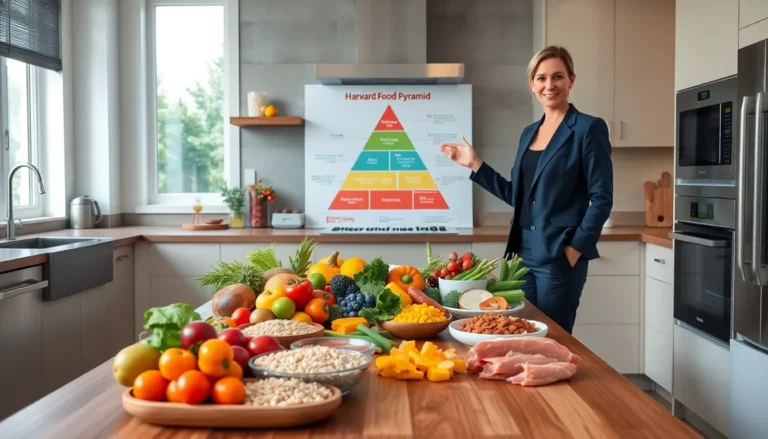Table of Contents
ToggleIn a world where broccoli often gets a bad rap and desserts reign supreme, teaching kids about nutrition can feel like a daunting task. But fear not! Nutrition books for kids are here to save the day, transforming the way little ones think about food. These colorful pages are packed with fun facts, engaging stories, and even some giggles, making healthy eating an adventure instead of a chore.
Imagine a book that turns vegetables into superheroes and fruits into magical creatures. With the right nutrition books, kids won’t just learn about what’s on their plates—they’ll be inspired to make healthier choices. So let’s dive into the delicious world of nutrition literature that not only educates but entertains, ensuring that the next generation grows up with a love for wholesome foods. After all, who wouldn’t want to munch on carrots when they’re portrayed as the champions of the dinner table?
Importance Of Nutrition Education For Kids
Nutrition education plays a critical role in a child’s development. Children gain knowledge about healthy eating choices through engaging materials. Understanding nutrition helps kids make informed decisions, steering them away from unhealthy options.
Books specifically designed for young readers increase awareness of food groups. They highlight the benefits of fruits, vegetables, whole grains, and proteins. According to the Centers for Disease Control and Prevention, children who receive nutrition education are more likely to consume healthier foods.
Positive associations with food emerge from fun and interactive learning experiences. Creative nutrition books often transform healthy foods into relatable characters. Kids develop a genuine interest in nutritious eating habits when they can relate to colorful illustrations and playful storytelling.
Engagement through nutrition books allows for memory retention and knowledge application. Parents and teachers can use these resources to guide discussions about food choices. Encouraging children to ask questions fosters a deeper understanding of nutrition.
Making healthy eating a fun topic contributes to long-term wellness. It cultivates an environment where children feel empowered to choose nutritious foods. From pooling knowledge to obtaining crucial skills, kids benefit immensely from effective nutrition education.
Top Nutrition Books For Kids
Nutrition books for kids offer valuable knowledge in enjoyable formats. Selecting the right book is essential for encouraging healthy eating habits.
Age-Appropriate Selections
Books geared toward specific age groups provide age-appropriate information. Toddlers benefit from simple concepts and colorful illustrations, while elementary-aged children enjoy stories with characters. Middle school students engage with informative texts featuring real-life applications of nutrition principles. For instance, “How Does My Garden Grow?” combines gardening with nutrition, appealing to younger audiences. “The Secret Life of Salad” captures the interest of older children through fun facts and narratives. Choosing books that match children’s developmental stages enhances comprehension and retention.
Engaging Illustrations And Activities
Illustrations bring nutrition concepts to life, making learning interactive and fun. Vibrant pictures attract young readers and create interest in healthy foods. Activities often accompany these illustrations, encouraging hands-on participation. For example, books like “Eat Your Vegetables!” contain recipes and games that promote cooking and eating vegetables. “The Everything Kids’ Cookbook” invites children to explore cooking through illustrated steps and fun challenges. Such interactive features foster a love for nutritious foods and support critical thinking about healthy choices.
Benefits Of Reading Nutrition Books
Nutrition books for kids offer numerous advantages beyond just reading. They serve as tools that foster healthy habits early in life.
Encouraging Healthy Habits
Through engaging narratives, nutrition books encourage kids to embrace healthy habits. Characters in these stories often model positive eating behaviors. Illustrations of fruits and vegetables as fun and appealing figures help shift children’s perceptions of wholesome foods. Kids become more willing to try new foods when they see them presented in a lively and enjoyable manner. Additionally, children learn about the importance of making nutritious choices, which sets the stage for lifelong healthy habits. Regular exposure to these concepts nurtures an environment where healthy eating becomes a natural part of their daily lives.
Enhancing Knowledge About Food
Reading nutrition books enhances children’s understanding of food and its benefits. These books provide essential information about food groups and nutritional value in a kid-friendly manner. By presenting facts through engaging illustrations, children can grasp complex ideas easily. They learn how different foods contribute to their growth and energy. Interactive elements, such as recipes and quizzes, promote active participation, further solidifying their knowledge. Kids become curious about where food comes from and the importance of balanced diets. Ultimately, this deeper understanding equips them to make informed decisions about their food choices as they grow.
Tips For Choosing The Right Book
Selecting the right nutrition book for kids involves understanding what resonates with them.
Consider The Child’s Interests
Identifying a child’s interests plays a crucial role in choosing books. If a child loves animals, books featuring healthy food characters may capture their attention. Engaging narratives about adventurous veggies can inspire curiosity. For kids fond of cooking, interactive books with simple recipes may encourage hands-on participation. Encouraging exploration of various topics helps maintain their enthusiasm for nutrition. Choosing books that align with hobbies or preferences fosters a deeper connection to nutritious foods.
Look For Author Credentials
Evaluating the author’s background provides insight into the book’s quality. Established authors in child nutrition possess relevant expertise and experience. Selecting books from registered dietitians or nutritionists ensures reliable information. Consider authors with a background in child development as they understand how children learn. Reading reviews and checking credentials can reveal the book’s credibility. Prioritizing authors with proven success in creating engaging materials leads to more effective learning experiences.
Nutrition books for kids play a vital role in shaping healthy habits from an early age. By making learning about food fun and engaging, these resources help children develop a positive relationship with nutritious choices. When parents and educators introduce age-appropriate materials, they create a supportive environment that encourages curiosity and exploration.
Selecting the right books tailored to children’s interests ensures that they remain engaged and excited about healthy eating. This proactive approach fosters lifelong wellness and empowers kids to make informed decisions about their diets. With the right nutrition literature, the journey toward healthier eating becomes an enjoyable adventure for the next generation.







